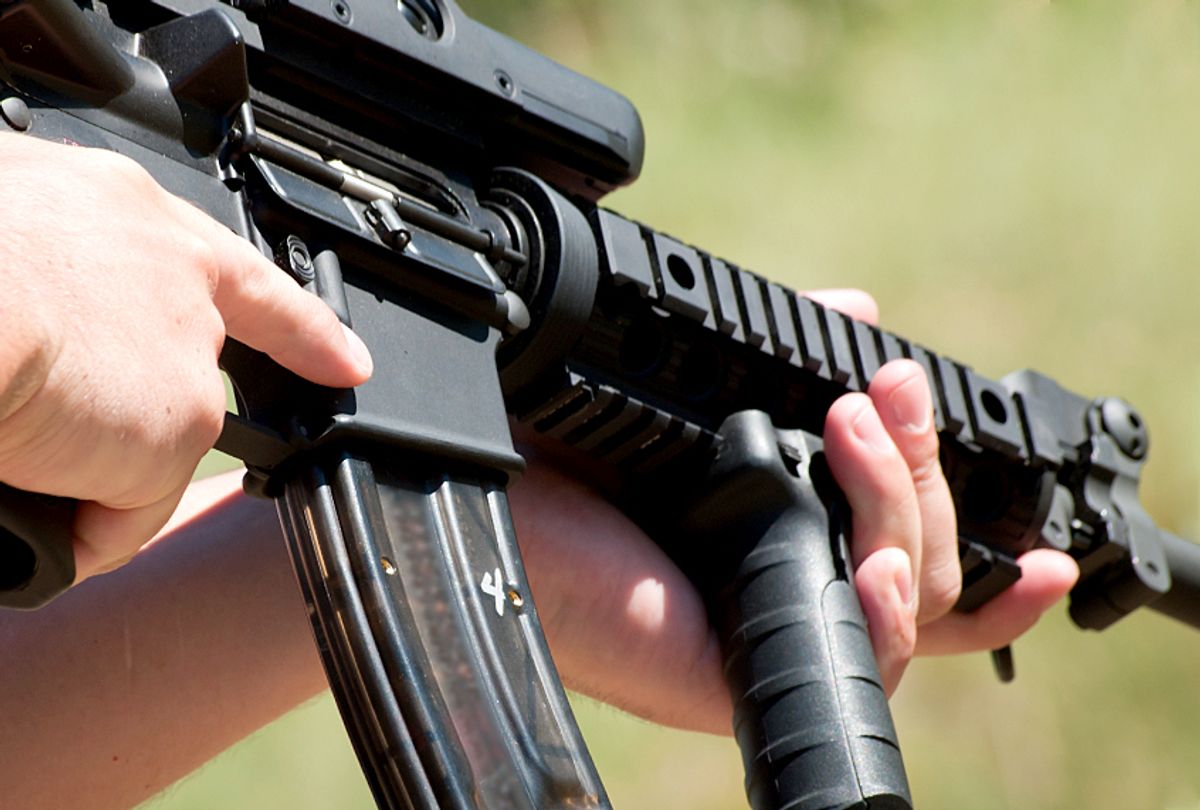The past few days, I haven't been able to stop thinking about the first time I held an assault rifle. It was 2011, and I was in New Orleans. Obviously, I was at party.
I'd been invited to the well-appointed home of a successful local entrepreneur, where catered wine flowed and musician guests jammed in his instrument-lined music room. Yet as the evening progressed, it became apparent that the fact that there was a northerner in the midst was a topic of even greater interest than the custom waterfall out back. It was some time after midnight when a male reveler asked the host, "Have you shown the yankee the safe room yet?"
So he showed me to his safe room.
Behind a thick yet otherwise nondescript door, a pantry-sized space held a cache of canned provisions, maps and guidebooks, boxes he said contained several thousand dollars in cash — and a wall full of military grade weapons. "You ever held one before?" he asked me. I shook my head no. A friend had taught me how to hold his revolver once, but that was the extent of my relationship with guns. I'd hated the experience. Even though I knew it was unloaded, my hands shook just touching it.
This time, my host gently took a rifle off the wall and presented it to me as if it were a bouquet of roses. "It's OK," he said. The safety switch was on; I remember him showing me. It may have been an AR-15; I only remember how surprisingly light it felt in my hands. The man then stood behind me and guided my arms up toward eye level, as the gun met my shoulder. A small group of male guests gathered around to view the spectacle, politely amused, like they were watching a dog trying to walk on its hind legs.
I turned my head back and said, "I have to ask. I live in New York. Can you explain this to me? Can you tell me why?" He met my gaze and answered without hesitation. "Because when the police aren't coming, and the military isn't coming, you protect your own." This was six years after Katrina. And for the first time, I understood. Because I've got mine too. "Feels good, doesn't it?" he asked. "Yeah," I answered, truthfully. "It does."
When I held that rifle in my hand, I'd thought I'd once again feel revulsion and fear. Instead, I felt power. An intoxicating surge of Clint Eastwood meets Liam Neeson "What did you just say to me?" power. For a moment I imagined myself invincible, and that I could handle anything that might come for mine. That night, in my hands, I briefly understood why people can fall in love with these things. But when I handed the gun back, the magic dissolved instantly. I remembered that power was an illusion. A dangerous one. Then I thanked my host and went back to a group of people singing old blues songs.
On April 20, 1999, I was one week away from learning that I was carrying my first child. On that day, I knew immediately that Columbine was a tragedy. But I was still naive enough to believe it was an anomaly. I'm not naive any more.
Now it's nearly 19 years later. Virginia Tech later. Sandy Hook later. Isla Vista later. Parkland later. Las Vegas and Orlando and Fort Hood and Sutherland Springs later. Every day, I kiss my kids goodbye and sent them off to school and out into the world. Every day, my heart drops a little bit when they walk out the door, when I pray that they come home. And I feel so, so powerless.



Shares